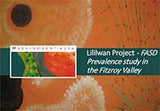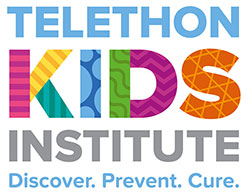What is FASD?
Video Transcript:Fetal Alcohol Spectrum Disorders, known as FASD, are conditions caused by pregnant mothers drinking alcohol during pregnancy which can damage the unborn baby and cause serious long term health, behaviour and learning difficulties. The damage caused to the unborn baby often occurs during the first twelve weeks of pregnancy when a woman may not even know she is pregnant. Drinking alcohol during all stages of pregnancy can cause harm. The impact on the baby depends on how much alcohol was consumed, the age and health of the mother and the use of other drugs during pregnancy. Children with FASD may have a range of physical, behavioural, emotional and learning difficulties, although these are often not identified until the child starts school. Our Marulu Unit in Fitzroy Crossing supports families by connecting them with support agencies and providing access to a range of resources to diagnose and navigate through FASD. FASD is 100% preventable but 100% permanent - the damage is there for life. Understanding the different types of FASDFASD refers to a range or spectrum of disorders which include the most severe of Fetal Alcohol Syndrome where a child has distinctive facial features known as sentinel features. These include a thin upper lip, a smooth philtrum, which is the the groove between the upper lip and the nose, as well as small eye openings. Other problems include reduced brain size, reduced growth and other birth defects. Other types include of FASD include:
Signs and symptomsFASD conditions will last a lifetime and can vary from person to person. Signs and symptoms include;
Early diagnosis and harm-free environmentsChildren with FASD present with a range of physical, cognitive, behavioural, emotional and learning difficulties, although these are often not identified until the child starts school. Results from our studies indicate that high numbers of school-age children face enormous challenges with learning as a result of prenatal exposure to alcohol. Research shows us that the earlier a child is diagnosed and receives intervention and support, the more likely the severity of the conditions are reduced. Diagnosis before 6 years of age can greatly change the outcomes of a child living with FASD and can reduce the likelihood of other behaviours and issues developing in adulthood. Creating a supportive, harm-free environment has also shown positive effects on children with FASD. This includes a loving and stable home environment, absence of violence and a supportive classroom setting.
|









